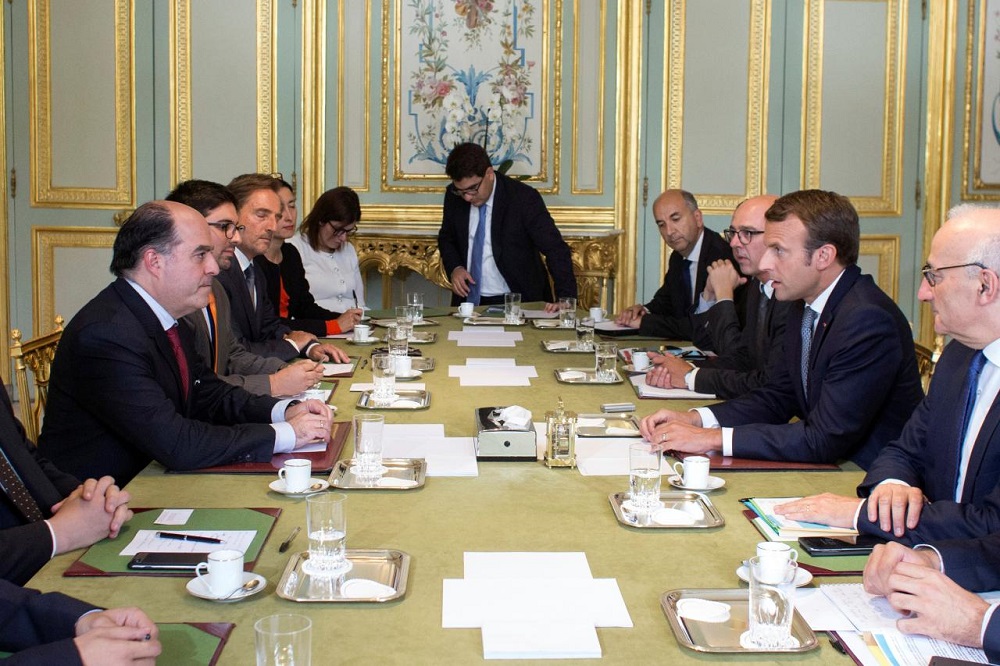French President Emmanuel Macron met on Monday with Venezuela opposition leaders in an effort to tackle the South American country’s dire humanitarian situation in wake of its ongoing political crisis.
Julio Borges, president of the National Assembly, and Freddy Guevara, the legislature’s first vice president, met the French leader in Paris. They are proceeding with meetings scheduled this week with European leaders aimed at increasing international pressure on President Nicolas Maduro to hold elections, respect a balance of power and allow humanitarian aid.
Borges and Guevara told Macron that Venezuelans are in dire need of basic necessities like food and medicine at the same time that Maduro’s government is stripping away basic civil rights. Borges said Macron asked “several times what he could do to relieve the crisis” and offered the possibility of providing humanitarian aid.
“Dozens of countries have offered free food and medicine and it’s unbelievable that the main obstacle is (the) government, the one which is supposed to defend the rights of the Venezuelan people,” Borges said.
“We want the government of Maduro to open the door to this humanitarian help.”
Hours after the meeting, Macron’s office issued a statement by the president indicating he was ready to push for European sanctions against Maduro’s administration.
Condemning what he called repression of the opposition, Macron said France was ready to launch European discussions “toward adopting measures targeting those responsible for this situation.” He did not elaborate on what he had in mind.
The situation in Venezuela has a particular resonance in France, where the far-left France Unbowed party, currently Macron’s most vocal opponent, backs Maduro.
Monday’s meeting took place two days after a leading activist was barred from leaving Venezuela in order to attend the Paris meeting.
Foreign nations including Spain and the United Kingdom, whose leaders are expected to meet with members of Venezuela’s opposition-controlled National Assembly this week, have decried the socialist government’s move to bar Lilian Tintori from leaving Venezuela.
Tintori, a prominent opposition activist, was scheduled to attend the meeting with Macron but Venezuelan immigration authorities seized her passport Saturday as she prepared to board her flight.
No official explanation has been given for why Tintori was barred from traveling, but it came a day after she was ordered to appear before a judge to answer questions about a large sum of cash found in her vehicle.
“They cannot silence the voice of 30 million Venezuelans,” Tintori said on her Twitter account, adding that Guevara had given Macron a letter from her.
Those who did make the Europe trip are also scheduled to meet with German Chancellor Angela Merkel, British Prime Minister Theresa May and Spanish Prime Minister Mariano Rajoy.
In Caracas on Monday, Venezuela’s Foreign Minister Jorge Arreaza summoned ambassadors from Spain, Germany Italy and the United Kingdom to issue a note of protest accusing them of meddling in Venezuela’s internal affairs.
“These types of expressions are absurd and offensive to the functioning of Venezuelan democracy and its institutions,” Arreaza said.
Maduro’s government has been criticized by the United Nations, Washington and other governments for failing to allow the entry of foreign aid to ease a severe economic crisis, while it overrides Venezuela’s opposition-led congress and jails hundreds of opponents.
The opposition won control of congress in 2015. But Maduro’s loyalist Supreme Court has tossed out every major law it has passed as the oil-rich country slips deeper into a recession exacerbated by triple-digit inflation and acute shortages of food and medicines.
